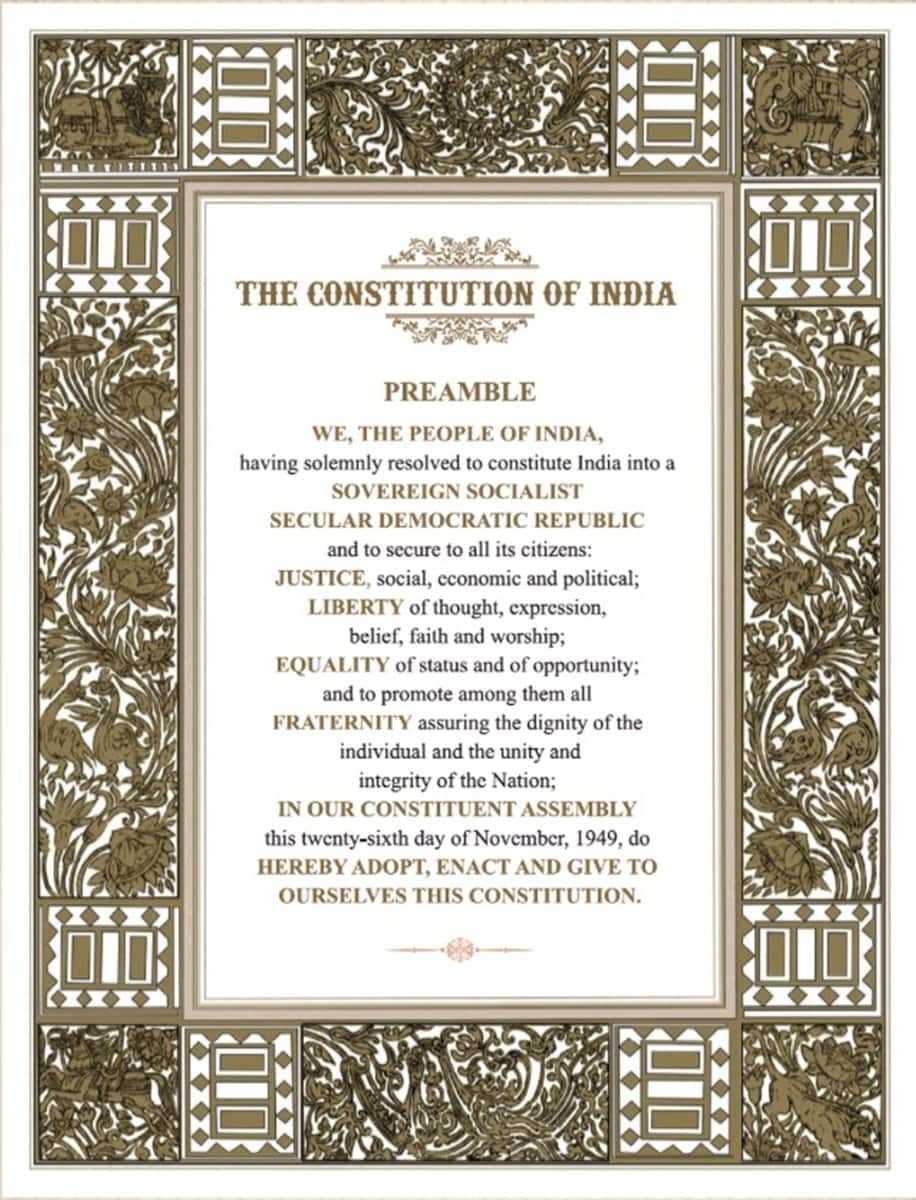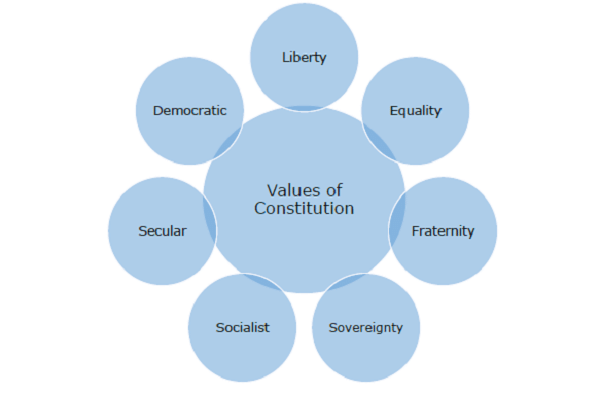Constitution : Schedules, Fundamental Rights, Forms of Writs, Parts of the Constitution and the New | Additional Study Material for CLAT PDF Download
 The Constitution of India
The Constitution of India
Schedules In Constitution
| 1 | First Schedule | List of States and Union Territories. |
| 2 | Second Schedule | Salary of President, Governors, Chief Judges, Judges of High Court and Supreme Court, Comptroller and Auditor General. |
| 3 | Third Schedule | Forms of Oaths and Affirmations. |
| 4 | Fourth Schedule | Allocate seats for each State of India in Rajya Sabha. |
| 5 | Fifth Schedule | Administration and control of Scheduled Areas and Tribes. |
| 6 | Sixth Schedule | Provisions for administration of Tribal Area in Asom, Meghalaya, Tripura, Mizoram & Arunachal Pradesh. |
| 7 | Seventh Schedule | Gives allocation of power & functions between Union & States. It contains 3 lists. 1. Union List (for Central Govt.): 97 subjects |
| 8 | Eighth Schedule | List of 22 languages of India recognized by constitution. 1. Assamese |
| 9 | Ninth Schedule | Added by 1st amendment in 1951. Contains acts and orders related to land tenure, Land tax, railways, Industries. [Rights of Property not a fundamental right now]. |
| 10 | Tenth Schedule | Added by 52nd amendment in 1985. Contains provisions of disqualification of grounds of defection. |
| 11 | Eleventh Schedule | By 73rd amendment in 1992. Contains provisions of Panchayati Raj. |
| 12 | Twelfth Schedule | By 74th amendment in 1992. Contains provisions of Municipal Corporation. |
Fundamental Rights
To Equality
| 1 | Article 14 | Equality before law and equal protection of law. |
| 2 | Article 15 | Prohibition of discrimination on grounds only of religion, race, caste, sex or place of birth. |
| 3 | Article 16 | Equality of opportunity in matters of public employment. |
| 4 | Article 17 | End of Untouchability. |
| 5 | Article 18 | Abolition of titles. Military and academic distinctions are, however, exempted. |
 Values of Constitution
Values of Constitution
Right To Freedom
| 1 | Article 19 | It guarantees the citizens of India the following six fundamental freedoms: (a) Freedom of Speech and Expression. (b) Freedom of Assembly. (c) Freedom to form Associations. (d) Freedom of Movement. (e) Freedom of Residence and Settlement. (f) Freedom of Profession, Occupation, Trade or Business. |
| 2 | Article 20 | Protection in respect of conviction for offences. |
| 3 | Article 21 | Protection of life and personal Liberty. |
| 4 | Article 22 | Protection against arrest and detention in certain cases. |
Right Against Exploitation
| 1 | Article 23 | Traffic in human beings prohibited. |
| 2 | Article 24 | No child below the age of 14 can be employed. |
Right To Freedm Of Religion
| 1 | Article 25 | Freedom of conscience and free profession, practice and propagation of religion. |
| 2 | Article 26 | Freedom to manage religious affairs. |
| 3 | Article 27 | Prohibits taxes on religious grounds. |
| 4 | Article 28 | Freedom as to attendance at religious ceremonies in certain educational institutions. |
Cultural And Educational Rights
| 1 | Article 29 | Protection of interests of minorities. |
| 2 | Article 30 | Right of minorities to establish and administer educational institutions. |
| 3 | Article 31 | Omitted by the 44th Amendment Act. |
Rights To Constitutional Remedies
| Article 32 | The right to move the Supreme Court in case of their violation (called the Soul and heart of the constitution by B R Ambedkar) |
Forms Of Writs
| 1 | Habeas Corpus | Literally means ‘to have the body’. Implies that a person imprisoned or detained by the law can enquire under what authority he has been imprisoned or detained |
| 2 | Mandamus | Literally means a ‘command’ issued by the court commanding a person or a public authority to do or forbear to do something in the nature of public duty. |
| 3 | Quo Warranto | An order issued by the court to prevent a person from holding office to which he is not entitled & to oust him from the office. |
| 4 | Certiorari | It is a Writ, which orders the removal of a suit from an inferior court to a superior court. (For speedy justicy). |
| 5 | prohibition | By a higher court to stop proceedings in a lower court on the ground of over-stepping of jurisdiction or isolation of the rules of natural justice. |
The New States Created After 1950
| 1 | Andhra Pradesh | Created by the State of Andhra Pradesh Act, 1953 by carving out some areas from the state of Chennai. |
| 2 | Gujarat and Maharashtra | The State of Mumbai was divided into two States i.e., Maharashtra and Gujarat by the Mumbai (Reorganisation) Act, 1960. |
| 3 | Kerala | Created by the State Reorganisation Act, 1956. It comprised Travancon and Cochin areas. |
| 4 | Karnataka | Created from the Princely State of Mysuru by the State Reorganisation Act 1956. It was renamed Karnataka in 1973. |
| 5 | Nagaland | It was carved out from the State of Assam by the State of Nagaland Act, 1962. |
| 6 | Haryana | It was carved out from the State of Punjab by the Punjab (Reorganisation) Act, 1966. |
| 7 | Himachal Pradesh | The Union Territory Himachal Pradesh was elevated to the status of State by the State of Himachal Pradesh Act, 1970. |
| 8 | Meghalaya | First carved out as a sub-State within the State of Assam by 23rd Constitutional Amendment Act, 1969. Later, in 1971, it received the status of a full-fledged State by the North-Eastern Areas (Reorganisation) Act, 1971. |
| 9 | Manipur and Tripura | Both these States were elevated from the status of Union Territories by the North-Eastern Areas (Reorganisation) Act, 1971. |
| 10 | Sikkim | Sikkim was first given the status of Associate State by the 35th Constitutional Amendment Act, 1974. It got the status of a full State in 1975 by the 36th Amendment Act, 1975. |
| 11 | Mizoram | It was elevated to the status of a full State by the State of Mizoram Act, 1986. |
| 12 | Arunachal Pradesh | It received the status of a full State by the State of Arunachal Pradesh Act, 1986. |
| 13 | Goa | Goa was separated from the Union Territory of Goa, Daman and Diu and was made a full-fledged State by the Goa, Daman and Diu Reorganisation Act 1987. But Daman and Diu remained as Union Territory. |
| 14 | Chhattisgarh | Formed by the Constitutional Amendment Act, 2000 by dividing Madhya Pradesh on November 1, 2000. |
| 15 | Uttarakhand | Formed by the Constitutional Amendment Act, 2000 by dividing Uttar Pradesh on November 9, 2000. |
| 16 | Jharkhand | Formed by the Constitutional Amendment Act, 2000 by dividing Bihar on November 15, 2000. |
| 17 | Telangana | Formed by the Andhra Pradesh Reorganisation Act, 2014 by dividing Andhra Pradesh on June 2, 2014. |
Parts Of The Constitution
| 1 | Part – I (Article 1-4) | Deals with territory of India formation of new states, alterations,names of existing states. |
| 2 | Part – II (Article 5-11) | Deals with various rights of citizenship. |
| 3 | Part –III (Art.12-35) | Deals with fundamental rights of Indian citizens. [Art. 31- dealing with the right to property was deleted by 44th amendment]. |
| 4 | Part- IV (Art.36-51) | Deals in Directive Principles of State Policy. |
| 5 | Part-IV-A (Art.51A) | Added by 42nd amendment in 1976. Contains the duties of the citizens. |
| 6 | Part-V (Art.52-151) | Deals with Govt. at the union Level. (Duties & function of PM, Ministers, President, Attorney General, Parliament – Lok Sabha & Rajya Sabha, Comptroller & Auditor General). |
| 7 | Part-VI (Art.152-237) | Deals with Govt. at State Level. (duties & functions of Chief Minister & his ministers, Governor, State legislative, High Court, Advocate General of the State). |
| 8 | Part-VII (Art.238) | Deals with States, was replaced in 1956 by the 7th amendment. |
| 9 | Part-VIII (Art.239-241) | Deals with Union Territory. |
| 10 | Part-IX | Consists of 2 parts: 1. Added by the 73rd amendment in 1992. Contains a new schedule ‘SCHEDULE ELEVEN’. It contains 29 subjects related to Panchayati Raj (They have been given Administrative powers). |
| 11 | Part-X (Art. 244, 244 A) | Deals with scheduled & Tribal Areas. |
| 12 | Part-XI (Art. 245-263) | Deals with relation between Union & States. |
| 13 | Part-XII (Art.264-300A) | Deals with distribution of revenue between Union & States, Appointment of Finance Commission (Article-280), Contracts, Liabilities etc. |
| 14 | Part- XIII (Art. 301-307) | Relates to Trade, Commerce & intercourse within the Territory of India. |
| 15 | Part-XIV (Art.308-323) | Deals with UPSC and Public Service Commissions. |
| 16 | Part-XIV-A (Art.323A,323B) | By 42nd amendment in 1976. Deals with administrative tribunals set up by parliament to hear disputes & complaints regarding Union, States or Local govt. employees. |
| 17 | Part-XV (Art.324-329) | Deals with elections (all Election Commission). |
| 18 | Part-XVI (Art. 330-342) | Deals with special provisions for Scheduled castes & Scheduled Tribes & Anglo-Indian Representation. |
| 19 | Part-XVII (Art.343-351) | Relates to official language. |
| 20 | Part-XVIII (Art.352-360) | Deals with emergency Provisions. |
| 21 | Part-XIX (Art.361-367) | Exemption of criminal proceedings for their official acts as President& Governors. |
| 22 | Part-XX (Art.368) | Deals with Amendment of Constitution. |
| 23 | Part-XXI (Art.369-392) | [Art- 396 gives temporary powers to the Parliament to make laws for State list]. [Art.-370 contains temporary provisions of J & K – Restricts the Parliament to make laws for the State]. |
| 24 | Part-XXII (Art. 393- 395) | Concerns the short title, commencement and repeal of the constitution. |
|
1 videos|19 docs|124 tests
|
FAQs on Constitution : Schedules, Fundamental Rights, Forms of Writs, Parts of the Constitution and the New - Additional Study Material for CLAT
| 1. What are the Schedules in the Constitution? |  |
| 2. What are the Fundamental Rights guaranteed by the Constitution? |  |
| 3. What is the significance of the Right to Equality? |  |
| 4. What is the importance of the Right to Freedom? |  |
| 5. What are the Forms of Writs mentioned in the Constitution? |  |





















